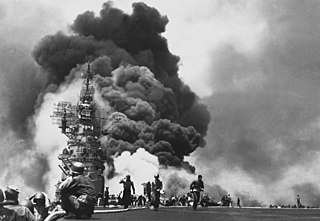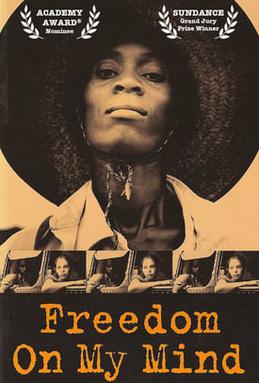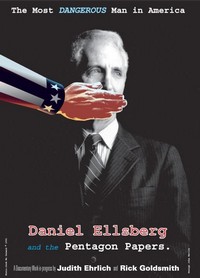Related Research Articles

Kamikaze, officially Shinpū Tokubetsu Kōgekitai, were a part of the Japanese Special Attack Units of military aviators who flew suicide attacks for the Empire of Japan against Allied naval vessels in the closing stages of the Pacific campaign of World War II, intending to destroy warships more effectively than with conventional air attacks. About 3,800 kamikaze pilots died during the war, and more than 7,000 naval personnel were killed by kamikaze attacks.
Erik Barnouw was an American historian of radio and television broadcasting. At the time of his death, Barnouw was widely considered to be America's most distinguished historian of broadcasting.

René Balcer is a Canadian-American television writer, director, producer, and showrunner, as well as a photographer and documentary film-maker.
Timothy B. Tyson is an American writer and historian who specializes in the issues of culture, religion, and race associated with the Civil Rights Movement. He is a senior research scholar at the Center for Documentary Studies at Duke University and an adjunct professor of American Studies at the University of North Carolina.
Donna Deitch is an American film and television director, producer, screenwriter, and actor best known for her 1985 film Desert Hearts. The movie was the first feature film to "de-sensationalize lesbianism" by presenting a lesbian romance story with positive and respectful themes.

Freedom on My Mind is a 1994 feature documentary film that tells the story of the Mississippi voter registration movement of 1961 to 1964, which was characterized by violence against the people involved, including multiple instances of murder.

Andrea Kalin is an American independent filmmaker, writer, producer, and director. She is also the principal and founder of Spark Media and founder and executive director of Stone Soup Productions, a 501(c)(3) non-profit foundation.

The Wrecking Crew is an American documentary film directed by Denny Tedesco, son of guitarist Tommy Tedesco. It covers the story of the Los Angeles–based group of session musicians known as the Wrecking Crew, famed for having played on numerous hit recordings throughout the 1960s and early 1970s. The film premiered at the 2008 South by Southwest Film Festival.

Planet B-Boy is a 2007 documentary film that focuses on the 2005 Battle of the Year while also describing B-boy culture and history as a global phenomenon. This documentary was directed by Canadian-American Korean filmmaker Benson Lee, shot by Portuguese-American filmmaker Vasco Nunes, and released in theaters in the United States on March 21, 2008. It was released on DVD on November 11, 2008.
The Erik Barnouw Award—also known as the OAH Erik Barnouw Award—is named after the late Erik Barnouw, a Columbia University historian and professor who was a specialist in mass media. The OAH -- Organization of American Historians -- gives one or two awards annually to recognize excellent programs, from mass media or documentary films, that relate to American history or further its study. The award was first presented in 1983.

Scottsboro: An American Tragedy is a 2001 American documentary film directed by Daniel Anker and Barak Goodman. The film is based on one of the longest-running and most controversial courtroom pursuits of racism in American history, which led to nine black teenaged men being wrongly convicted of raping a white woman in Alabama. The film received an Oscar nomination for Best Documentary Feature. It was funded in part by the National Endowment for the Humanities.

Erik Walter Gandini is an Italian-Swedish film director, writer, producer and professor of documentary film at Stockholm University of the Arts.
The GI Film Group was founded in 2007 by Army veteran Laura Law-Millett and Brandon Millett and established the GI Film Festival (GIFF) with the goal of preserving the stories of American veterans past and present through film, television and live special events. GIFF's flagship festival is held each May during Armed Forces Month in Washington, D.C. from 2007 to 2018.

The West, sometimes marketed as Ken Burns Presents: The West, is a 1996 television documentary miniseries about the American Old West. It was directed by Stephen Ives and featured Ken Burns as executive producer. It was first broadcast on PBS on eight consecutive nights from September 15 to 22, 1996.

The Most Dangerous Man in America: Daniel Ellsberg and the Pentagon Papers is a 2009 American documentary film directed by Judith Ehrlich and Rick Goldsmith. The film follows Daniel Ellsberg and explores the events leading up to the 1971 publication of the Pentagon Papers, which exposed the top-secret military history of the United States' involvement in Vietnam.

Bill Brand is an experimental film and video artist, educator, activist and film preservationist.
Connie Field is an American film director known for her work in documentaries.
Negroes with Guns: Rob Williams and Black Power is a 2004 feature film by directors Sandra Dickson and Churchill Roberts. It was a National PBS Broadcast, on Independent Lens, in February 2006. The film won the 2006 Erik Barnouw Award for Outstanding Historical Documentary, of the Organization of American Historians, the Audience Award of the Detroit Docs Film Festival, in 2005, and the Critic's Award for Outstanding Feature Documentary of the New York UrbanWorld Film Festival, in 2005.

Vivian Kleiman is a Peabody Award-winning documentary filmmaker. Other honors include a National Emmy Award nomination for Outstanding Individual Achievement in Research and an Academy Award nomination for Documentary Short.

Kolt 15 Gap is a 1971 Yugoslav short documentary film written and directed by Jovan Jovanović and Miodrag Milošević. It follows the life, views and whreabouts of an unemployed Marxist metalworker. The film belongs to the Yugoslav Black Wave.
References
This article includes a list of references, related reading, or external links, but its sources remain unclear because it lacks inline citations .(June 2014) |
- Japan Focus: Challenging Kamikaze Stereotypes: “Wings of Defeat” on the Silver Screen
- NPR Story: 'Wings of Defeat': Kamikaze Stories, Told in Person
- Japan Times: Neither Heroes Nor Villains
- CNN.com: 'Kamikaze' film delves behind war propaganda
- Reuters:Documentary examines Kamikaze pilots